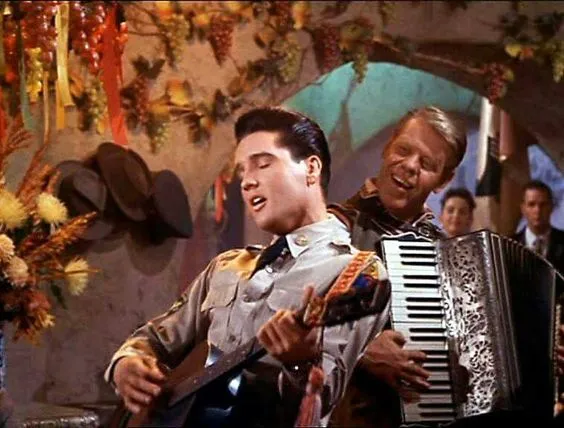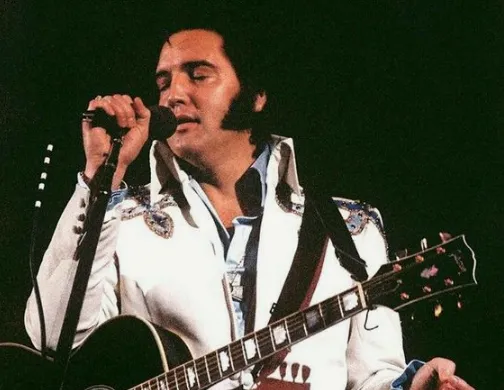About the song
(Watch the video below)
Elvis Presley, the King of Rock and Roll, transcended the boundaries of music to conquer the silver screen with his charismatic presence. Among his numerous cinematic ventures, "Flaming Star" stands out as a testament to Presley's acting prowess and the versatility of his talent. Released in 1960, directed by Don Siegel and based on the novel by Clair Huffaker, "Flaming Star" presents a compelling narrative set against the backdrop of racial tensions and familial conflicts in the American West. This film not only showcases Presley's ability to inhabit complex characters but also reflects the social and cultural dynamics of its time.
At the heart of "Flaming Star" lies the character of Pacer Burton, portrayed by Presley, a young man torn between two identities - his white heritage and his Native American roots. The film delves deep into the struggles faced by individuals caught between two cultures, grappling with questions of belonging and allegiance. Presley's portrayal of Pacer is nuanced and poignant, capturing the internal conflict and external pressures faced by the character with sensitivity and depth.

What sets "Flaming Star" apart from other Presley films is its departure from the typical musical formula. While Presley's musical talents are showcased through a few poignant ballads, such as the titular "Flaming Star," the film primarily focuses on drama and action, allowing Presley to flex his acting muscles in a more serious role. This departure from his usual on-screen persona highlights Presley's range as an actor and his willingness to take on challenging and unconventional roles.
One of the most striking aspects of "Flaming Star" is its exploration of race relations in the American West during the 19th century. The film sheds light on the prejudice and violence faced by Native Americans at the hands of white settlers, as well as the complexities of interracial relationships. Through Pacer's character, "Flaming Star" confronts issues of identity, discrimination, and the devastating impact of colonialism on indigenous communities.
The supporting cast of "Flaming Star" further enhances the film's narrative depth. Veteran actor Steve Forrest delivers a powerful performance as Pacer's conflicted brother, Clint, adding layers to the complex dynamics within the Burton family. Barbara Eden shines as Roslyn Pierce, Pacer's love interest, whose own mixed-race heritage mirrors his struggles for acceptance. Together, the cast brings authenticity and emotional resonance to the film, elevating it beyond mere entertainment to a thought-provoking exploration of identity and belonging.
Director Don Siegel's deft hand behind the camera is evident in the film's breathtaking cinematography and gripping storytelling. From sweeping vistas of the untamed West to intimate moments of human drama, Siegel captures the essence of the frontier with both beauty and brutality. His collaboration with Presley yields a film that is not only visually stunning but also thematically rich, resonating with audiences long after the credits roll.

Despite its critical acclaim and enduring legacy, "Flaming Star" was not without its controversies. The film's exploration of racial themes and its sympathetic portrayal of Native American characters sparked debate among audiences and critics alike. Some praised its boldness in tackling such sensitive subject matter, while others criticized it for perpetuating stereotypes and romanticizing the past. Nevertheless, "Flaming Star" remains a landmark achievement in Presley's filmography, showcasing his talent in a new light and pushing the boundaries of what audiences expected from the King of Rock and Roll.
Beyond its significance as a cultural artifact, "Flaming Star" endures as a timeless tale of resilience, love, and redemption. Through Pacer's journey, audiences are reminded of the enduring human spirit and the power of understanding and compassion to bridge divides. Presley's performance as Pacer Burton remains a testament to his enduring legacy as both a musical icon and a formidable actor.
In conclusion, "Flaming Star" stands as a testament to Elvis Presley's cinematic triumphs and his enduring impact on popular culture. Through its compelling narrative, stellar performances, and thematic depth, the film continues to captivate audiences and provoke thought long after its initial release. As Presley's legacy endures, so too does the legacy of "Flaming Star," a timeless classic that continues to shine brightly in the cinematic firmament.


